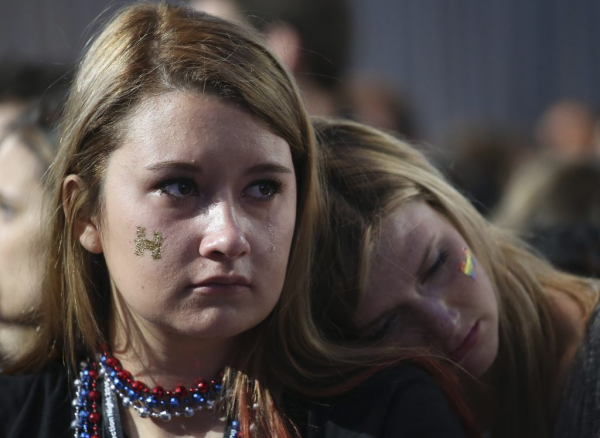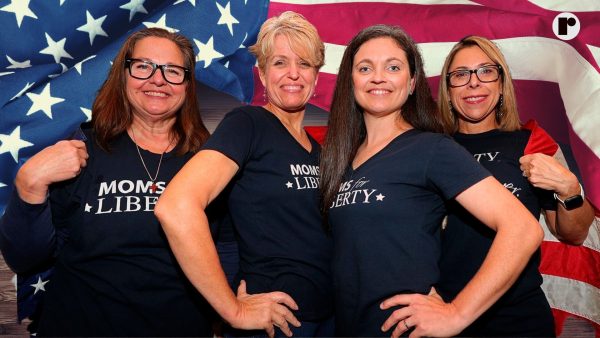The faultiness of neutrality in political journalism
Democrats and Republicans are not equals–neither in policy, nor governance, nor in rhetoric–because–the banishment of an entire world religion, the deportation of millions of undocumented immigrant families, the militarization of the police, the perception of the criminality of African-Americans and Latino immigrants, the perception of Muslim-American sensibility towards religious terrorism, the sexual objectification and exploitation of women, the delegitimation of the scientific theory of climate change, the dismantlement, through privatization, of the social programs of Social Security, Medicare and Medicaid, the reversal of decades of established United States foreign policy, the embracement of foreign adversaries, the enragement of foreign allies, the delegitimization of American institutions (governmental, intellectual, journalistic, cultural, electoral) and the presidential candidate who supports or agrees with all of the aforementioned theories, ideas, or plans–were some of the focuses of the Election of 2016.
Politics intersects with many different academic fields and areas of human knowledge. Governmental policies need to address scientific, medical, technological, militarial, economic, financial, legal, sociological, cultural, and moral issues. It is the responsibility of journalists, as is that of politicians, to well-inform themselves on the complexities of those stated issues and the implications of governmental policies as they relate to them, rather than relay the ideological beliefs and philosophical ideas of the politicians behind them.
(A strong principled conservative belief in small government, and thus constantly adopting stances that would allow one to legislate the effective removal of power and authority from the federal government, does not serve as a proper justification for all one’s policy stances, especially as the social, economic, financial, and now medical interests (the repeal without replacement of the ACA) of individuals and families are at risk.)
For the past election season, there were several different factors that contributed to the loss of Democratic presidential nominee and former United State Secretary of State, Hillary Clinton–analysis and explanations of the election, in its totality, should not be reduced to “economics”, “racism”, or “sexism” alone, but should also include our electoral system (the Electoral College, voter registration systems), campaign strategy, the unfavorability of the candidates, the common malpractices of political journalism (types and length of coverage), lack of political involvement and enthusiasm, and the spread of misinformation and disinformation about the candidates, policies, and issues; and of course, the actual ideologies and policies of the candidates themselves.
(And—if a disfavored, non-traditionally conservative, radical-almost, yet confusingly ideologically-fluid and embarrassingly expedient, newly-registered Republican, whose views are so antithetical to his own party’s preachment of Christian principles, sense of morality, and declaration of family values, were to run for the United States presidency and campaign on an identity-infused economic populist message, with ethno-religious nationalistic elements and anti-intellectual sentiments, that appeals almost entirely to non-college educated, white working class voters, then this is one of the few presidential elections in which he could have done so, so successfully. (Thanks, Obama, … Hillary.)
(But that aside … .) These simplifications of the past election season is are misdeeds that do permanent, or at least significant, harm to the political and intellectual state of our country. The profession of journalism has established itself as a part essential to the functioning of our democracy, as journalists inform or influence the public’s perception of the world, government, politicians, policy, and issues. If journalism as a profession is corrupted by misinformation, disinformation, and generally, a lack of truth–reality, then the effects of such corruption are damaging and irreversible.
Employing neutrality places limitations on public discussions and knowledge. On coverage of race-related issues, journalists fail to address the historical and sociological complexities of race and ethnicity in the United States that affect the our perceptions and the situation described–there is no room for it. Our society as it now stands is the result, in part, of those racial, ethnic, cultural interactions and conflicts that are commonly dismissed or removed from the context of the situation. To the credibility of the nation’s most respectable news organizations and politicians, the ideological views of African-Americans have not, in recent years, been equalized or set inferior to those of ethno-religious nationalist organizations, such as the Klu Klux Klan (KKK), with a history of racial terrorism in the American South. To do otherwise would serve, not only as a validation of homophobia, racism, ethnicism, sexism, xenophobia, and bigotry, all of which the KKK represents, but would also reinforce the ideas that have led to of centuries of anti-black oppression in the United States, through its many forms–African enslavement, torment, and abuse; the establishment of Jim-Crow laws, the sharecropping system, and racial segregation; and racial discrimination in business, housing, transportation, and education policy–by said groups, as not unacceptable and eliminative. Thinking with such an example in mind, the principle of neutrality would allow for such a thing to happen–the equalization of a victim with their victimizer, the terrorized with the terrorizer.
A forgotten example is of this effect is the coverage of the extra-judicial lynchings and killings of African-Americans in the South in the late 19th to early 20th century. Due to then-remaining cultural beliefs in the biological, intellectual, moral inferiority of African-Americans in American society, a black man, falsely accused of theft, violence, or rape would be quickly condemned to an extrajudicial death by mobs of white men. Coverage by journalists of said events would consider the viewpoint or claims of said white men equally (if not above) said lone black man, given such situations presented themselves without proper and sound evidence to defend either side. Here, the then-recent reality of African-American slavery and goal of racial integration was forgotten, and such incidents were treated as isolated and non-prejudicial. Disregarding the nature of the criminal accusation or that those journalist could not then examine, in totality, the complexities of their historical situation, it should have been concluded that such criminal charges are meant to be brought to the attention law enforcement and handled within the confines of the United States justice system. Such occurrences were covered by Ida B. Wells, a progressive female African-American civil rights activist and journalist, who intended to expose the biases in and falsities of such incidents.
The most interesting of aspect of said example in relation to modern-day conversations of neutrality is the way in which our beliefs and values inform or shape what is culturally perceived as moral or just, and how thus, here it is argued that our modern values of tolerance for all persons of all races/ethnicities, genders/sexualities, and cultures/religions, should serve as a journalistic standard for which all have to report by, when, at the same time, it should be noted that white Americans, and therefore, also the journalists of Wells’s time, generally viewed black inferiority with indifference or treated it as if fact, much in the same way the equality of humans, on all fronts, as fact is here treated.
This is hard to discern–cultural changes that result from social progress (or perhaps now, regression) that affect what is perceived as valued, moral, and standard in said culture, and how those changes translate to journalism and the way in which journalists cover their stories. There is no definite answer; but, to accept, follow, apply, and uphold oneself to what values and morals are culturally dominant in society at that time–that answer still leaves worry, and also, slight fear. That, more than anything else, challenges the basic premise of this piece’s argument and, also to some extent, long standing views of the practice of journalism itself. That outlined rebuttal, in effect, argues that the truth changes along with our perception of what should be true, and that the truth, as all ideas to ever have existed, is just another human construct.
The emergence of a new generation of right-wing movements, predicated on the desired of banishment non-Western immigration, on anti-black racism, on anti-feminism, nationalism, the belief in the moral superiority of Christians, and the belief in the intellectual and cultural superiority of white Westerners–through their vocal and prevalent support of and indirect affiliation with a president-elect–have made recent headlines. The individuals apart of these movements have rejection the labellings commonly attributed to their ethno-religious nationalistic theories, and thus are not met with the same disgust, fear, and condemnation that their predecessors now are.
In recent months, there was a particular politician that received support from select ethno-nationalist organizations with histories of racial terrorism, yet because that said politician released a general denouncement of the support of hateful individuals and hate-related groups (simultaneously?–yes, magically, somehow), it was disregarded. Journalists–instead of questioning why such support from those hate-related groups was so vocal and prevalent, or the alignment of many of their views on race, religion, and immigration with said politician–suggested that he should, by name, continue to condemn those groups, as if it could change any thing about the reality of the situation.
Transitioning to a less extreme example–neutrality would mean to inadequately discuss the implications of economic policies, such as the lowering or increasing of tax rates. Mainstream media outlets have faced criticism from conservative and Republicans for the perceived biases of journalists in their selection, presentation, and reporting of stories. In recent years, it seems that outlets, most notably, the Cable News Network (CNN) have attempted to balance their news coverage with negative results.
Historically, the conservative economic policies of administrations of Ronald Reagan, George W. Bush, and George, H. W. Bush have led to significant rises in wealth inequality, income inequality, and the exploitation of workers and consumers by businesses, corporations, and other economic and financial institutions. To give a brief summation: Reagan’s controversial supply-side economic policies have allowed for the nation’s highest brackets of income-earners to retain more of their own wealth and shifted more significant percentages of government-enforced tax income onto the nation’s lowest brackets of income-earners. George W. Bush presided over an economic downturn that would consequentially result in the election of his then-opponent Bill Clinton (D-AK) in the Election of 1992. The presidency of George H. W. Bush accumulated in the greatest economic recession in United States history since the Great Depression of the early 20th century.
Instead of providing detailed explanations of any specific policy proposal, or relating to audiences, the social and economic consequences of such policies (the same that have remained ineffectual for poor Americans for forty or so years), there are some journalist who seem to prefer making restatements of what are now considered “talking points” about the government’s role in the economy from politicians, and whether such implemented policy aligns with those ideological beliefs. The use of false equivalences, or a logical fallacy that refers to the equalizing of two morally or intellectually unequal statements, ideas, beliefs, or actions, seems to prevail in the journalism of mainstream media outlets and does the public a great disservice.
(Many individuals question, not only the applications of history, but the legitimacy of it as an academic discipline that is essential to the education of children and adults alike, yet in politics, it seems both the electorate and politicians would benefit from even the slightest review of it, brief though it may be.)
The one of the worst of these offenses concerns coverage of scientific and medical issues. Climate change is accepted by the international scientific community as factual, current, and significant in our world. The United States, in conjunction with many other nations through international organizations such as the United Nations, have crafted energy-related policies to reduce the effects of climate change on environmental, economic, and political situations. Yet, there was a particular United States politician who claimed, through social media that, “the concept of global warming was created by and for the Chinese in order to make U.S. manufacturing non-competitive”, and that, “any and all weather events are used by the GLOBAL WARMING HOAXSTERS to justify higher taxes to save our planet! They don’t believe it $$$$!” and lastly that,“this very expensive GLOBAL WARMING bulls**t has got to stop. Our planet is freezing, record low temps, and our GW scientists are stuck in ice”.
That politician stands to dismantle or limit all regulations and taxes established to reduce the effects of climate change that were implemented, many through executive order, under the Obama Administration. The politician has also stated that he intends to withdrawal the United States from the Paris Agreement, an agreement reached by hundreds of nations within the international community, in response to their concerns over the future environmental, economic, and political consequences of climate change, to regulate industries related to the extraction of oil, gas, and other natural resources to limit the emissions resulting from those activities and transfer their resources and dependency on said industries to more renewable and sustainable sources of energy.
The treatment of climate change by the mainstream media (the name for a collective group of well-known news organizations) is closer to that of a religious-secular issue, like human reproductive rights or marriage equality, as opposed to a scientific fact–another aspect, of reality. The politician was not held accountable for his ignorance, chosen or not, in this regard–he was, in fact, awarded with power to implement policy based upon his ignorant, chosen narrative, so to the detriment of our environment, economy, and society–the world–and as one guesses, as it relates to our energy policy, as well.
The politician’s statements regarding on nuclear policy, communicated through social media and controversial cable television hosts, deserves an article of its own.
The current state of news and media is not well. While viewership over the past year has increased due to coverage of the Election of 2016, the American public’s respect of journalists and trust in news media as an institutional part of American society is relatively low compared to other professions and institutions. According to Gallup polling from September of 2016, over a ten year period (2005-2015), trust in the media has declined by nearly 18% for people of all political affiliations. The decline was sharper for Republicans and Independents. Whether there are problems or concerns with biases, neutrality, objectivity or lack thereof, there needs to be some internal alterations and reforms to the way in which news organizations present themselves, topics, and stories, because, it has evidently had a significant impact on public opinion and viewership.
The journalistic process should remain as scientific as possible, in every sense of the word. Journalists should continue the research, evaluation, interpretation, and documentation of information to most accurately portray the truth of the situation and reflect the greater reality of our world.
The placement of political biases into the reporting or writing of stories is separate issue; a discussion that is more commonly had, and one in which it is understandable to have quickly navigated and concluded–a suggestion is to identify and advocate for the removal of biases from journalism, where said biases are in conflict with morality and truth. Many forget or deny, but the truth often does take sides, political or whatever else, and neutrality, in effect, argues that the truth, at times, can be both itself and its exact opposite.
(To journalists who have advocated for the idea of being “neutral” (in the sense here described) in their reporting of politics as it relates to debate over morality and fact, there is a reason that journalism as profession exists in an independent, established field of its own; generally speaking, people have careers and occupations of their own–meaning … they are too busy, to do your job.)









Kathleen Dowling • Mar 22, 2017 at 11:35 pm
This is honestly so clever and so incredibly well-written.
Stephen Torres • Mar 22, 2017 at 11:13 pm
Submit this to some news outlets or social media if you can/want. This article is a clear and definite truth that every journalist/ public speaker needs to hear and practice. My mug is spilling with this truthful tea.